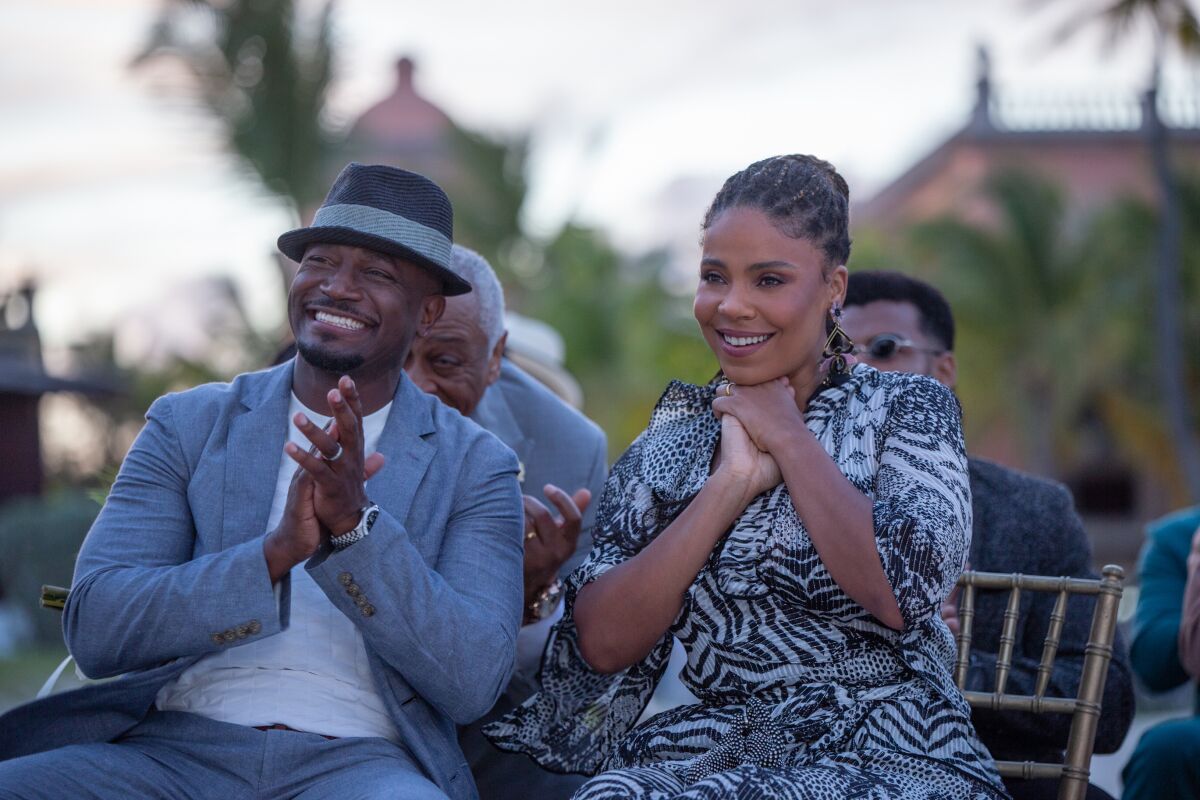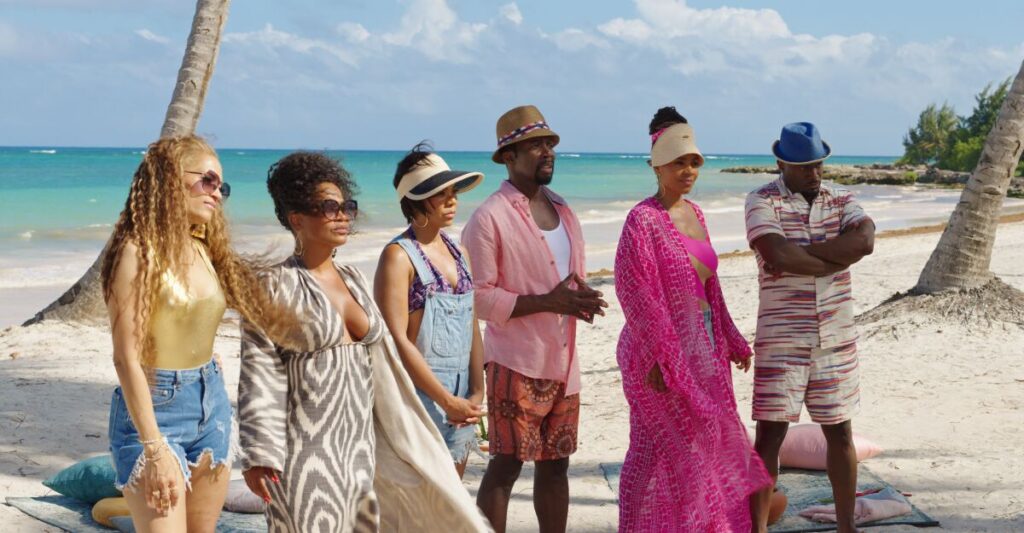Over the Christmas and New Year’s holidays, many people participated in nostalgic activities and went to familiar places where they celebrated growing up and growing closer to those around them. Peacock’s “The Best Man: The Final Chapters,” the series that ends the movie franchise created by director Malcolm D. Lee, could’ve been the cozy socks around the TV fire in the households of certain Black Gen Xers.
Since its launch with 1999’s “The Best Man,” the actors and characters have grown with their target audience from young adulthood to middle-aged professionals. The relatability of the film and its 2013 sequel, “The Best Man Holiday,” has led to friend groups identifying which members of their own cliques correspond to characters from the movie.
Is someone a Jordan? Uber capable, ambitious, in charge. A Harper? Artistic, single-minded, career-focused. Or even a Lance? Alpha male dealing with life’s changes and raising kids in 2022. The cast includes almost all of the original actors: Morris Chestnut as Lance, Melissa De Sousa as Shelby, Taye Diggs as Harper, Regina Hall as Candy, Terrence Howard as Quentin, Sanaa Lathan as Robyn, Nia Long as Jordan and Harold Perrineau as Murch. The series, which debuted Dec. 22 and takes place a few years after “Holiday” in the characters’ timeline, catches up with the cast as relationships evolve and past grievances resurface in what the show is calling “a midlife crisis meets a midlife renaissance.”
“The impetus for writing ‘Best Man’ was the opportunity for upwardly mobile, educated, successful or aspirational Black folks — middle-class Black folks — to see themselves reflected on the screen. So I think that the chemistry between the actors and the characters feels very familiar and real and authentic,” says creator, writer and director Malcolm D. Lee. “They deal with some very real-world feelings, situations and complexities that I think people appreciate. People want to keep revisiting these characters because they know them, they are them, or they have friends that are them.”
Melissa De Sousa as Shelby, Nia Long as Jordan, Regina Hall as Candy, Harold Perrineau as Julian, Sanaa Lathan as Robin and Taye Diggs as Harper in “The Best Man: The Final Chapters.”
(Peacock)
With successful sequels, the conventional thinking is that there must be something new added. Bigger. Better. Different. Even with themes of aging, tolerance with your kids, career transitions and more, a subtle change of storytelling perspective might be the most noticeable difference. Executive producer Dayna Lynne North came into a situation and onto a set that had 20 years of friendship and a couple of successful movies weaved into it. They knew what worked and had insight into their characters that went beyond what was onscreen or on the page. North was a fan of the franchise and had been inspired by its representation of relationships.
“When we met, I told [Malcolm Lee] that I very much relate to these characters. I relate to that idea of friends who love each other but can also have those moments of life. ‘You get on my nerves, but I still love you,’” says North. “I remember getting to USC and feeling like I had found my tribe of artsy Black film and theater and art nerds. It was deeply relating to this friend group in ‘The Best Man’ … that they were each other’s chosen family.”
Despite the love, North did come in with a critical eye. A veteran of television, having worked on series such as “Veronica Mars” and “Insecure,” North also understood that in the transition from a two-hour feature to an eight-episode series, stories would need to expand. This also gave her and Lee the opportunity to “step back and, in this iteration of the franchise, [ask] ‘How can we open up the women’s stories?’”
“[Lee] wanted to write a romantic comedy from a Black man’s point of view. That was the whole reason he wrote ‘The Best Man.’ It’s right there in the title, right? He wanted to create it inan era of ‘Love, Jones’ and ‘Waiting to Exhale’ and those kind of films for men,” says North. “But for me, coming into it as a Black woman, I had always felt like the women were just counterparts to the men’s story. They rode side saddle, and the women in the franchise, to me thus far — and I think Malcolm would acknowledge the same thing — had kind of been written as bit parts while the men’s stories were centered. And so that was definitely something that I was excited about and something I think he wanted to do as well.”
Harold Perrineau, Dayna Lynne North and Morris Chestnut on the set of “The Best Man: The Final Chapters.”
(Dayna Lynne North’s personal archive)
The actors felt the new energy in the storytelling, and North’s physical presence was also helpful as the show continued to develop during filming.
“It was really great having her on set. I love Dayna because she was a great new sound in our ears,” says Perrineau. “I’m a little older than the characters. So for me, she brought this real current ‘I’m in the middle of this’ kind of perspective that was really helpful for me to dive in and go ‘Oh, OK, I see what you all are dealing with and what you’re feeling, and it all makes sense.’”
De Sousa also noticed the emphasis on the women’s story lines, and was a part of making it happen. She approached Lee and expressed that it was “really important to me this time around that [he] show a full woman, a full human being with all dimensions of light and character” for her role.
“I have to have some meat,” she says. “I have to have some emotion. I don’t want to just be a funny scene stealer, which is great. Not going to complain about that. But you have to show her heart.”
Besides the focus on women, the series delves into life transitions that affect most people in their 40s and 50s — raising kids/young adults, career adjustments, health concerns and even reevaluating relationships. Each iteration of “The Best Man” followed the characters through their growing pains, and “The Final Chapters” will continue that.
“One of the things that I was excited about was, like, the idea of midlife metamorphosis, because midlife doesn’t have to be a crisis, right? It doesn’t. I mean, it’s a common cliché and a well-known phrase, but it’s another coming-of-age for me,” says North.
Chestnut’s Lance encapsulates much of that coming-of-age change that all of the characters are going and have gone through. An aging professional football player, a widower in the process of moving on, and a father trying to understand his son whose gender difference confused him, Chestnut has not only seen his character’s growing pains, but has watched as the franchise continued to attract fans and become a cult favorite.
“I think the one thing that Malcolm has done very well is present the audience with something that they don’t expect, which is really hard in a sequel,” says Chestnut. “A lot of people came to see ‘The Best Man Holiday’ and just expected to laugh and have fun — but then they had to deal with death. In ‘The Final Chapters,’ they’re not expecting it to end [the way that it does]. So I think Malcolm does a good job, again, of keeping people on their toes.”

Sanaa Lathan as Robin and Taye Diggs as Harper Stewart may not have the ending some suspect in “The Best Man: The Final Chapters.”
(Peacock/Nicolas Cordone/Peacock)
In this era of sequels and prequels and streaming breakouts, it’s unexpected that this would be the end for a franchise that may have been given a bit of new life with the series. Lee has made it clear, though, that this is it for the ‘Best Man’ cinematic universe. For the creators and cast, the end was, in a word, satisfying.
“When I set out to make the show and called it ‘The Final Chapters,’ it was not like just a catchy name. What I believe, and I still believe it, is that I don’t have any more to tell. I guess people may want that, but I think it’s better that you keep people wanting more rather than, as they say in television, jump the shark,” says Lee.
“I guess, as we talked about it in our writers’ room, we wanted to walk away from these characters in a way that felt authentic and in a way that felt satisfying,” says North. “We wanted to honor what felt right to the character’s journey and then also what feels right to the story. At a certain point, I think a story, if you listen with your intuition, a story will start to speak to you. And we all did our best to listen and pay attention and find that balance.”
For Perrineau, whose character experienced a big dramatic shift during the series, the end seemed inevitable and was worth it.
“I feel really satisfied with the entire journey from ‘The Best Man’ to the end of this thing as ‘The Final Chapters.’ If we never see those characters onscreen again, I would feel satisfied that we actually did something that was wonderful and relevant.”
‘The Best Man: The Final Chapters’
Where: Peacock
When: Any time
Rating: TV-MA (may be unsuitable for children under the age of 17)
_

